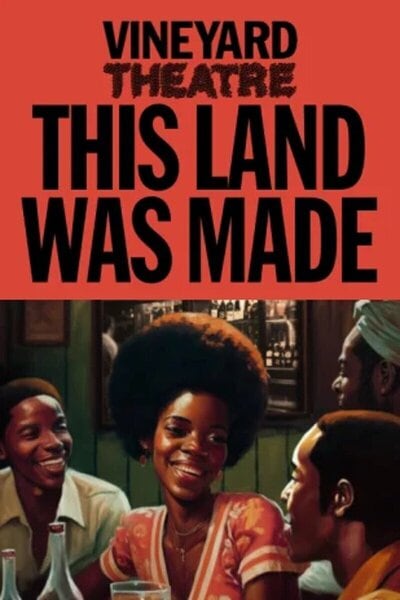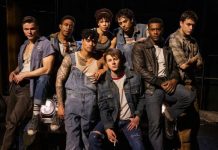Told in the format of a memory play, the world premiere of Tori Sampson’s This Land Was Made, playing a limited Off-Broadway engagement at Vineyard Theatre, presents a fictionalized account of a pivotal event in Oakland and the Black Power Movement of the 1960s, from the perspective of Sassy – a writer, bar owner, and self-proclaimed griot (a West African storyteller who preserves, embellishes, and passes on the oral history of her people, transported to America via slave ship). It’s a stirring, funny, and timely fantasia directed by Taylor Reynolds and inspired by the playwright’s own familial connection to the Black Panther Party, as described to her by her mother, which resonates in our current time of unrest and activism.
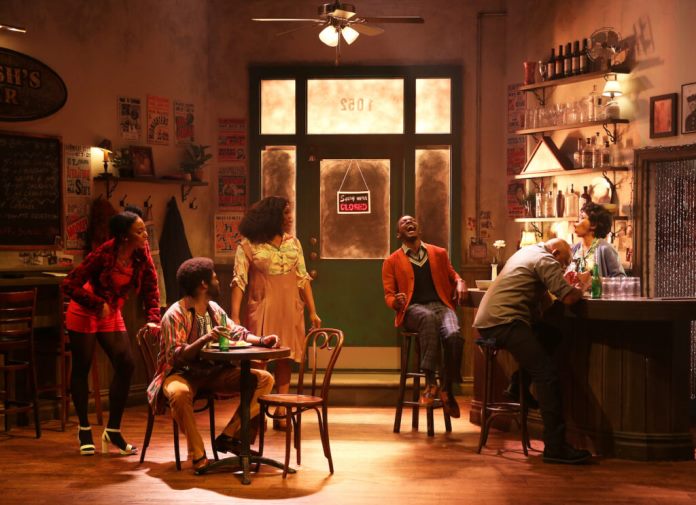
A group of family and friends hang out, drink, eat, flirt, dance, get their hair trimmed, and debate their differing socio-political ideologies on Black life and liberation at Trish’s Bar (then owned and run by Sassy’s eponymous mother), until Black Panther co-founder Huey Newton (1942-89) arrives on the scene and launches their talk into action. Centered around the real-life arrest and conviction (later appealed and overturned) of the counterculture leader for the 1968 shooting of two white policemen, which left one of them dead, the show combines Sassy’s engaging direct-address narration and asides to the audience with re-enactments of scenes at the bar, readings from her book-in-progress (to be called Made for You and Me), and re-imagined alternate scenarios of the fatal incident and other events that took place outside of her firsthand eye-witness experiences at Trish’s.
Antoinette Crowe-Legacy as Sassy (a nickname she prefers to her given name Karen that suits her cheeky attitude) leads an excellent cast that delivers the distinctive personalities, beliefs, inter-relationships, and conflicts with humor and commitment. Libya V. Pugh’s Trish, a Louisiana-born transplant to California, who painfully lost her son Jonathan in the Vietnam War, provides the perspective of an experienced older generation, a matriarchal presence, a warm homey atmosphere, and great Creole cooking that keep the regulars coming back to the bar.
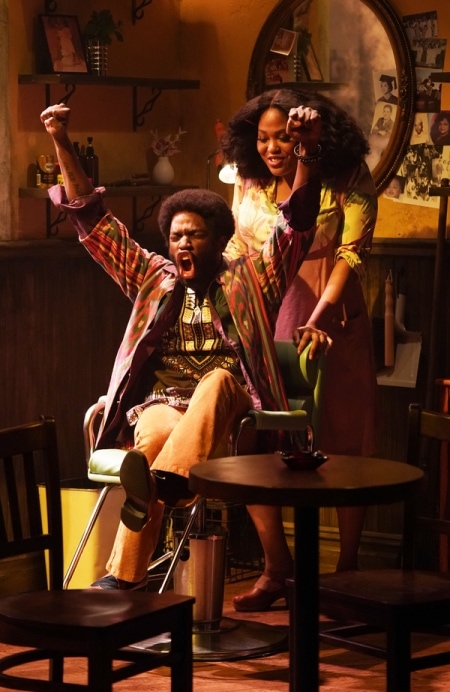
They are joined by Gail, Sassy’s flirty fun-loving friend, played with relish by Yasha Jackson, who is determined to enjoy life after her boyfriend (and Sassy’s brother) Jonathan’s profoundly affecting death; Ezra Knight’s Mr. Far, a local auto mechanic who has eyes for Trish, a fatherlike concern for Sassy, and a nephew Gene, portrayed by Curtis Morlaye, who has become a dedicated Black Panther member; Matthew Griffin’s determined and idealistic Troy, a college student dating Sassy and preparing for a career in law; and the unemployed Drew, amusingly captured by Leland Fowler, who espouses change, embraces the radicalism of the Black Panther Party, refuses to work for a white boss, and verbally spars and trades insults with the much more conservative Troy over their divergent ideas.
Enter Huey Newton, embodied by Julian Elijah Martinez, who advocates the need for the large Black population to rise up, and to carry guns to protect themselves from the armed police, who willfully attack them, in conversations at the bar and in an impassioned public speech reconjured for us by Sassy (ironically, Newton was shot to death, in 1989, by Tyrone Robinson, a member of the competing Black Guerilla Family – a fact omitted from Sampson’s script, in which the griot states only that “he died in 1989”). And when Troy suffers a shocking and bloody racist attack and begins to question the validity of his stance on Black assimilation and equality, he is open to Newton’s invitation to accompany him by car to a rally. It’s a decision that culminates in the infamous police stop and shooting (seen in multiple disparate versions in Sassy’s conceived retelling), changes everything, and ultimately impacts everyone at the bar.
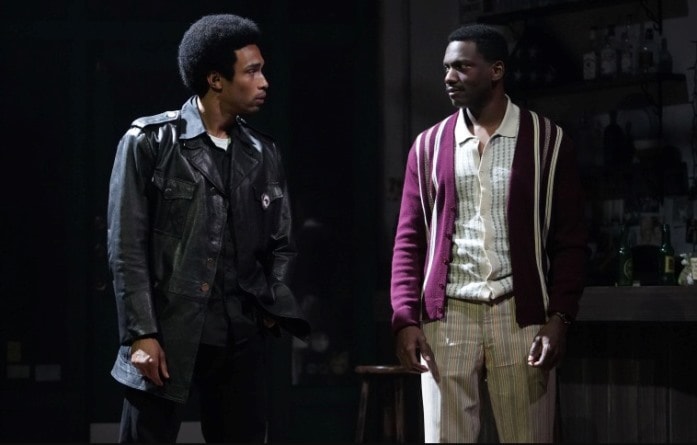
The storytelling is supported by a transporting design that takes us back to the era, with a familiar and comfortable set design by Wilson Chin, props supervision by Alexander Wylie, period-style costumes by Dominique Fawn Hill and Deshon Elem, and hair and wigs by Nikiya Mathis, which also serve to distinguish between the generations and ideals of the individual characters (short and straightened hair and traditional clothing versus natural Afros, radical modern dress, and Newton’s bullet cartridge bandolier), as do their dialects. Sound and original music by Fan Zhang set the stage for the time and the action (including the pop hits they sing along and dance to and the thunderous applause for Newton’s speech), and Adam Honoré’s lighting signals both shifts in time and from the everyday encounters observed by Sassy to the fantasized recreations, triggered by the snap of her fingers.
This Land Was Made is an example of a captivating storyteller taking artistic license to create an entertaining, provocative, and fictionalized view of history that will leave those who lived through the turbulent ‘60s reflecting on the past and those who didn’t inspired to do further reading on the subject.
Running Time: Approximately two hours, including an intermission.
This Land Was Made plays through Sunday, June 25, 2023, at the Vineyard Theatre, 108 East 15th Street, NYC. For tickets (priced at $35-79, plus fees), go online. Masks are required for Saturday and Sunday Masked Matinees and are encouraged for all other performances.


